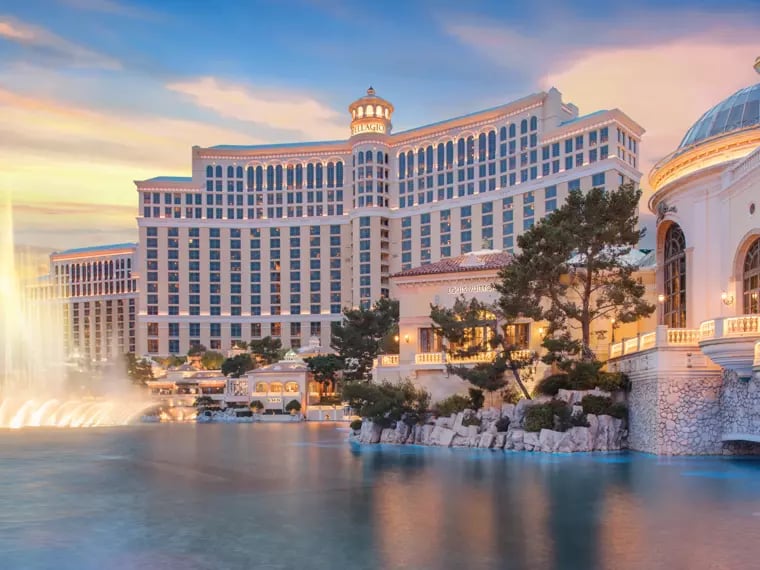MGM Resorts (MGM +0.43%) may have a better chance of being a winning bet than either Las Vegas Sands (LVS +0.12%) or Wynn Resorts (WYNN 1.34%), because it is a more geographically diverse operation.
With a meaningful presence in multiple markets, MGM would not be hurt as much by a downturn in any one region. It may miss out on some of the highest highs as a result, but should also avoid the lowest lows. Instead, it promises investors a steadier performance, something borne out by its second quarter earnings results.

Image source: Getty Images.
A diverse portfolio
Like Las Vegas Sands and Wynn Resorts, MGM Resorts has casinos in Macau, China. However, unlike those rivals, most of MGM's revenue is derived from the U.S., where it owns half of the casinos on the Las Vegas Strip. While that suggests it could be hurt by any downdraft that sweeps through the city, the impact would be blunted, because MGM also has significant operations elsewhere.
Properties outside of Las Vegas currently contribute around half of MGM's revenue and 40% of its adjusted earnings before interest, taxes, depreciation, and amortization (EBITDA).
As my colleague Travis Hoium recently explained, property EBITDA is a better yardstick than revenue to use when sizing up casinos, because it measures an individual casino's cash flow. And when we look at how the markets responded after MGM, Sands, Wynn, and Caesars Entertainment reported their latest earnings -- which did indeed show the Vegas Strip weakening (and Macau's growth slowing) -- MGM has suffered the least.
Gaming Stocks Performance Comparison, data by YCharts.
Individually, MGM's U.S. casinos might not amount to much, but collectively they're a profitable group. Also, with the growing legalization of sports gambling, the company has an opportunity to sweep up additional revenue. The Northeast is expected to become the capital of sports wagering. MGM's Borgata in Atlantic City -- New Jersey's largest and most profitable casino -- also became the first casino in the state to begin accepting bets on sports. It took in nearly $1 million in sports-betting revenue over the first 17 days such betting was legal.
MGM is going to have more competition soon, as other casinos and racetracks enter the sports betting market, and as other states pass a regulatory framework for sports gambling. However, MGM also has casinos in places like Maryland and Michigan, plus one that is about to open in Massachusetts, so it should be ready to capitalize on the opportunity.
Making money here and abroad
MGM's best-performing domestic casino in 2017 was the Bellagio, with adjusted EBITDA of almost $505 million, while the next closest was the MGM Grand, with $344 million in adjusted EBITDA. Yet the casino with the largest amount of adjusted EBITDA was the MGM Macau, with nearly $525 million.
The casino operator opened the MGM Cotai in Macau earlier this year. This resort could become hugely profitable for MGM Resorts once it gets up to its full operating posture. However, it is also cannibalizing some of MGM Macau's revenue and profit. Still, in the long run, the two resorts should be a powerful combination.
MGM Cotai will also serve as the perfect foil to Wynn Resorts' Wynn Palace, which is located right across the street and became the first casino to open in the Cotai district two years ago. Its opening marked the resurgence of the Macau region, which had fallen hard after a crackdown on corruption.
However, whereas the Palace focuses on the VIP segment of the gambling public, the MGM Cotai is targeting the mass market, which is key because Beijing has directed the region to focus on nongambling activities to generate most of its revenue.
Wynn, in line with its heritage of world-class luxury, opted to install upscale retailing opportunities and dining experiences. MGM, on the other hand, has installed attractions that would appeal more to a mass audience, including the Spectacle, a massive, four-story display of 25 LED video screens that spans the length of a football field.
The Palace was plagued from its opening by construction going on in the immediate vicinity that made it difficult to reach the casino. The MGM Cotai won't face that difficulty, as the construction has been cleared and the light rail system can shuttle gamblers in from the ferry serving Hong Kong.
The key takeaway
Wynn Resorts and Las Vegas Sands aren't nearly as diversified as MGM. Because they are almost wholly dependent upon Macau for their revenue and profit, they are also at the whim of regulators and politicians who may crack down on gambling once more.
Macau's disappointing June gaming revenue report caused the stocks of Wynn and Sands to sink, while MGM Resorts stock hardly budged. That speaks to its relative immunity to disappointing results in any one location. This could make MGM Resorts the best bet in the casino industry.









